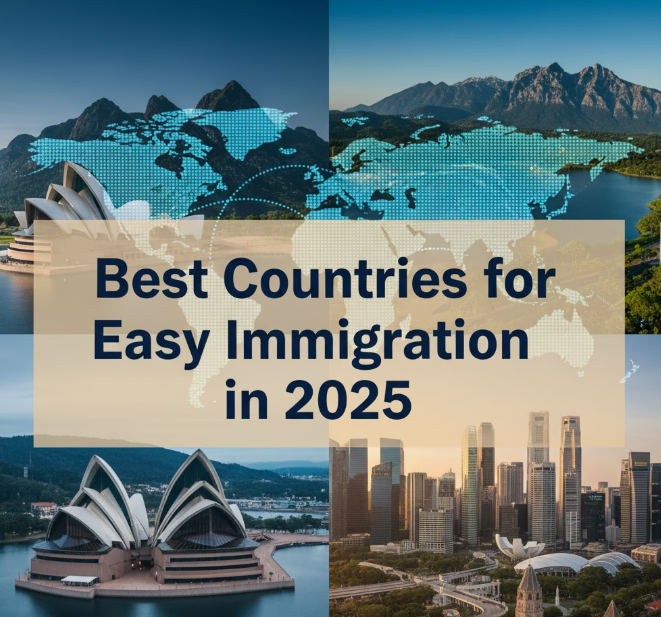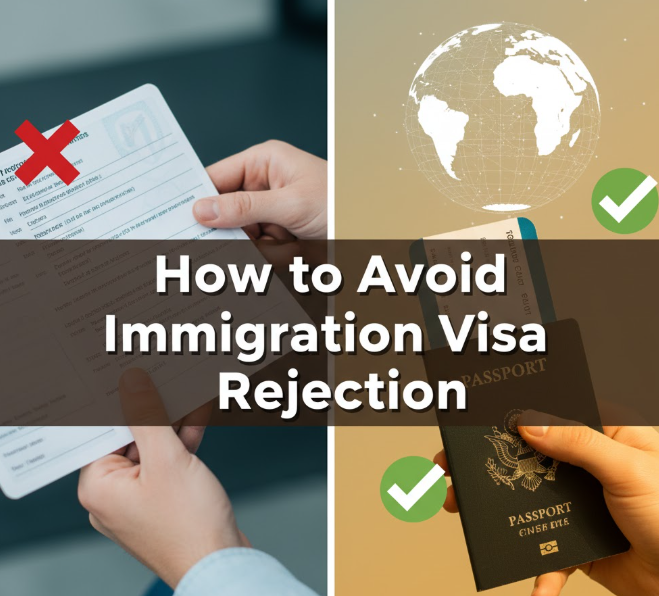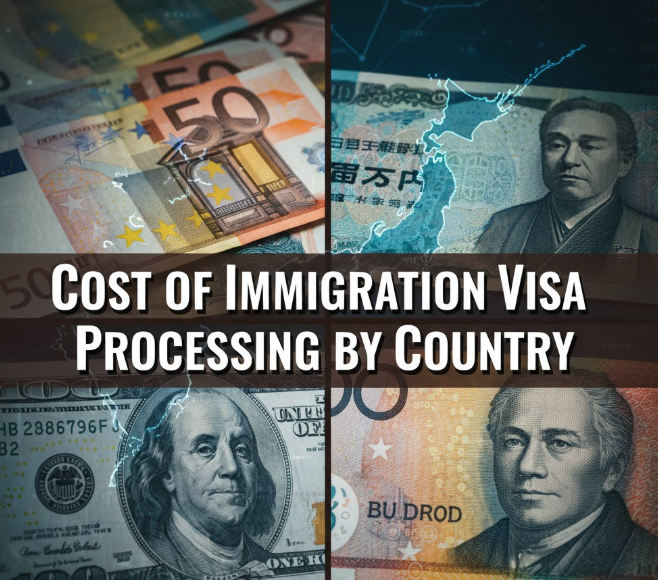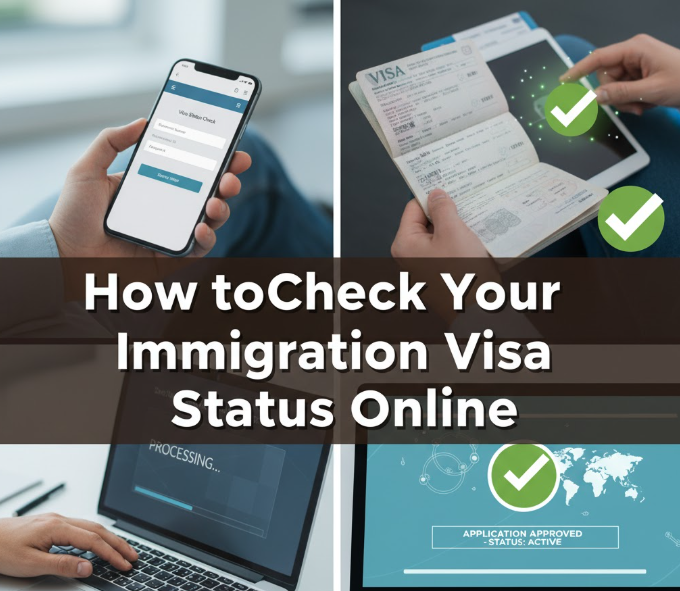It’s as if you’ve flipped the page in your life to a completely new chapter. When it comes to having better job prospects, getting a good education or just feeling safer, where you live is crucial. But let’s face it: Immigration isn’t a straightforward process. In some countries, you might face paperwork mountains, extensive processing times and multitudinous rules that can make your head whir.
The good news? Not all countries are that way. In 2025, the doors to a number of countries are open wider than anyone would have believed just a few years ago, and good routes in that used be circuitous or closed off altogether are surprisingly clear. From Canada’s welcoming point systems to Portugal’s relaxed visa programs, the opportunities are there for people who know where to find them.
This guide takes you through the countries that have made immigration less burdensome up to the year 2025. We’ll dissect what makes each special and what it’s looking for in newcomers, and help you figure out how if — or when — you can make your own move without losing your mind.
Reasons Why People Relocate to Another Country
Before getting into details about specific countries, it may be helpful to understand why. The answers are all over the map, but some themes have started to emerge.
Economic opportunities top the list. A lot of people leave their home country in search of better paying work or greater stability. Others seek respite from unemployment or restricted career opportunities in their home country.
Education animates yet another huge wave of migration. Parents want their children to attend selective schools and top-tier colleges and universities. Students themselves pursue degrees from colleges that will somehow translate into their future careers.
Safety and security are no less important. Whether it is political upheaval, crime rates or natural disasters, people are driven to find a more peaceful shore. When that seems dicey, getting access to health care or better infrastructure or a more stable government are suddenly really tempting.
Sometimes it’s about lifestyle too. Some wish for better weather and cleaner lands; others just want to try out a different culture. Some are eager to rejoin family members who left for other countries years ago.
What Makes Immigration “Easy”?
Sure, easy immigration is hardly a walk in the park. Immigrating is always hard, takes time and needs to be done right. But countries have certainly made the process easier in many cases than others.
How easy a country is to immigrate to depends on several factors:
Clear paths and programs — A clear immigration program in a country that lets you know exactly what needs to be done always makes everything very easy. When the rules are clear, you can plan.
Processing times – In some countries applications are managed in months, others take years. The faster processing, the sooner you start your new life.
Points-based systems — Systems under which points are given for, among other things, skills of a migrant, education, language and work experience. If you make the cut, that’s it. No guessing game about whether you’ll qualify.
Language requirements – Countries that accept English or waived the language requirement are out of reach for many prospective candidates.
Affordability – Entry fees, decreased investment amount or no obligation to provide proof of hefty bank accounts makes immigration feasible for others.
Openness of job market – Countries looking for people with certain types of talent ensures a physical and direct way to get there.
Canada: The Friendly Northern Giant
Curious which work-friendly countries take in the most immigrants? Canada does quite well overall, and 2025 is no exception. It has said that it was planning to accept more than 485,000 new permanent residents this year alone.
Express Entry System
Express Entry: Canada’s Express Entry is still the crème de la crème for skilled-worker visas. This points-style system ranks candidates based on such things as their age, education, work experience and language skills.
The value in Express Entry’s truthfulness. You can find out what your Comprehensive Ranking System (CRS) score is before you even apply online. There are regular draws inviting the highest-scoring candidates to apply for permanent residence.
Recent updates have only made the system even more accessible. Canada now rewards additional points for French language proficiency, Canadian work experience or a job offer from a Canadian employer.
Provincial Nominee Programs
If you feel that Express Entry is a stretch for you, there are other ways through the Provincial Nominee Programs (PNPs). Each Canadian province administers its own program in pursuit of particular skills or demographics that it needs.
Saskatchewan and Manitoba, for instance, have programs that are just for truck drivers or workers in the agriculture sector. British Columbia targets tech professionals. Programs of the Atlantic provinces tend to be less competitive than federal programs.
Family Sponsorship
Canada makes it relatively easy for citizens and permanent residents to sponsor relatives. Spouses, partners, children, parents and grandparents are all eligible to be sponsored — though there can be a wait.
The Parent and Grandparent Program generally opens once a year for a limited number of spots, it’s relatively competitive. The spousal sponsorship program is much quicker, often a 12-month maximum wait.
Common Immigration Options with Processing Time and Eligibility Summary
| Immigration Path | Processing Time | Key Requirements |
|---|---|---|
| Express Entry | 6-8 months | CRS score over cutoff, language test, education assessment |
| Provincial Nominee | 8-14 months | Varies by province (often requires job offer) |
| Family Sponsorship | 12-24 months | Canadian sponsor, evidence of relationship |
Portugal: Europe’s Hidden Gem
Portugal comes out as a favourite in Europe for immigrants, thanks to appealing weather, cheap living and welcoming immigration policies.
D7 Visa for Passive Income
Intended for retirees, remote workers and those with passive income sources, the D7 visa. Prove that you have a stable income from your pensions, investments or remote work and Portugal wants you.
The threshold income is a low one—about €760 per month for the single applicant. Tack on €380 for a spouse and €230 per child. For lots of retiring households with pension income or digital nomads who make foreign money, these numbers are doable.
D7 visa holders can apply for permanent residency or citizenship after five years of legal residence. Portugal also provides tax breaks for new residents, through its Non-Habitual Resident (NHR) regime that can eliminate almost all of the income tax you pay.
Golden Visa Program (Modified)
Portugal Golden Visa also saw new developments in the recent years, with coastal property investment options being recently removed. Nevertheless, it continues to thrive.
At present, all they can do is buy property inland or bring in their own funds — for investment, job-creation, capital transfer and research/culture respectively. The minimum investment is €280,000 for purchases in low-density regions.
What differentiates this program is the little residency it requires. You also have to spend a grand total of seven days a year in Portugal to keep your visa. After five years, you can apply for citizenship without having ever lived there full time.
Work Visas and Tech Opportunities
Portugal’s tech scene has been booming in recent years, particularly in Lisbon and Porto. The country makes it easy for tech talent to immigrate, with fast-tracked work visa processes.
The Tech Visa program accelerates applications for tech workers employed by approved companies. That processing time can be as short as three months, by European standards lightning fast.
Germany: Economic Giant and Open Doors
Germany is confronted with serious labour shortages in many sectors – resulting in an increasingly immigration-friendly climate five years from now.
Skilled Workers Immigration Act
Upgraded for 2020; Germany’s skilled workers immigration act gives clear access routes to skilled professionals. Workers with vocational training, not just college degrees, are now welcome in the country.
If you’re qualified in shortage occupations — nursing, engineering, IT, skilled trades — Germany needs you. First, you need to get your qualifications signed off, find a job offer and then apply for a work visa.
EU Blue Card
EU Blue Card: the EU blue card is Germany’s visa for qualified applicants. In order to qualify, you must have a university degree and land an offer of employment that meets minimum salary requirements (approximately €58,400 per year in 2025 or €45,552 for shortage occupations).
Blue Card holders have certain advantages, such as: faster access to permanent residence (21-33 months), easier family reunification and the freedom of movement within European Union states for work purposes.
Opportunity Card (Chancenkarte)
Enter the Opportunity Card, which is the latest of Germany’s dramatic shifts in perspective. This points system allows you to enter Germany and look for work there for up to one year.
You receive points for qualifications, professional experience, language skills, age and the degree to which you are already linked with Germany. Even without a job offer, if you hit a certain points threshold, you can move to Germany and look for work there.
This eliminates the catch-22 that many immigrants confront: needing a job offer to secure a visa, but having to be in the country to take most jobs.
Australia: Land Down Under Opens its Doors to Skilled Workers
At the same time, Australia is continuing its long history of recruiting migrants under robust programs.
Skilled Migration Program
Australia’s skilled migration also works on point system whereby candidates with the most points are invited to apply for permanent residency. You must score a minimum of 65 points to qualify although many competitive rounds will carry higher scores.
The system assigns points for age (25 to 32-year-olds get maximum marks), English proficiency, work experience, level of education and other factors like Australian study or work experience.
Australia has a Medium and Long-term Strategic Skills List (MLTSSL), which includes those occupations that are highly in demand. If you’re on the list of professions, you are in luck.

State Nomination Programs
Just as Canadian provinces have versions of their own programs, states and territories in Australia each administer a program of their own nomination. Each state has variations in its rules and in what the highest-priority occupations are, based on local needs.
South Australia, Tasmania and Northern Territory will generally have less developed programs compared to New South Wales or Victoria. These are regions that are ambitiously recruiting in order to even out of population distribution across the country.
Employer Sponsorship
If you’re lucky enough to be able to get a job offer from an Australian employer which for some reason are keen on sponsoring you then this is one of the easier paths. The employer does a ton of the paperwork and convinces the government that there isn’t an available Australian suitable for this work.
There are also opportunities for TSS visas to transition to Permanent Residence over a few years. Most migrants enter on an employer sponsored visa before progressing to a skilled migration visa.
New Zealand: Small but Mighty
New Zealand may be small, but it is mighty when it comes to being friendly to immigrants.
Skilled Migrant Category
New Zealand’s Skilled migrant is like Australia with a bit of difference. You must have 160 points or more to be invited to apply for residency under the pool.
Points are awarded for skilled employment, qualifications, work experience and other criteria such as a job offer or New Zealand qualifications. In the latter country bonus points are awarded for work experience in absolute skills shortage occupations.
Work to Residence Programs
There is no such “pathway” in New Zealand but there are a variety of pathways that offer migrant temporary visas in the short term and moves them directly to residence. The Long Term Skill Shortage List lists jobs where an employer can directly sponsor employees for residence-track visas.
This is especially good news for those in the health, engineering, construction management and skilled trades.
Green List
New Zealand’s Green List, unveiled recently, allows fast-track residency for those in much-needed occupations. If you work in one of these professions and meet the qualifications, you can obtain residency immediately or after two years on that job.
Jobs range from doctors and engineers to electricians and tech workers. This is one of the quickest Immigration Programs available in the world today!
Country Comparison Overview
| Country | Main Pathway | Processing Time (months) | Key Advantage |
|---|---|---|---|
| Canada | Express Entry | 6-8 | High immigrant intake, multiple pathways |
| Portugal | D7 Visa | 2-4 | Low income requirements, EU access |
| Germany | Skilled Worker Act | 3-6 | Strong economy, vocational training accepted |
| Australia | Skilled Migration | 8-12 | High living standards, points-based clarity |
| New Zealand | Skilled Migrant | 6 | Fast-track Green List occupations |
Spain: Sun, Culture and Opportunities on the Rise
Traditionally, Spain’s been more restrictive for non-EU immigrants, however they’re making it increasingly easier.
Digital Nomad Visa
But beyond Spain’s new and popular Digital Nomad Visa, the program is also notable. Remote workers earning a salary from foreign companies will be able to live in Spain and carry out their work.
Among the criteria: proving remote work is possible, earning more than minimum salary thresholds and demonstrating health insurance. It’s a five-year visa that comes with positive tax treatment for the first four years.
Non-Lucrative Visa
Much like Portugal’s D7, Spain’s Non-Lucrative Visa is aimed at those with passive income or savings. You can’t work for Spanish companies, but you can live in Spain drawing on retirement income, investments or remote work from sources that are not located in Spain.
There are more financial demands than posed by Portugal — you’ll need about €28,000 per year if just a single person is applying — but this is still an accessible amount for most retirees and remote workers.
Work Permits and EU Access
Working for a Spanish company is still the most traditional option. Spain has been relaxing regulations on some sectors experiencing labor shortages, such as computer technology, healthcare or agriculture.
After a year’s legal residence, you can apply for longer-term permits. Five years in the house unlocks a path to permanent residence and then citizenship.
United Arab Emirates: Middle East’s Cosmopolitan Center
Through creative visa schemes, the UAE has reinvented itself as an immigration-friendly destination.
Golden Visa
Its Golden Visa program grants 5 or 10-year residency to investors, entrepreneurs, specialists in the medical, scientific, research and technical fields as well as students with promising scientific potential.
Unlike many countries, the UAE doesn’t make it easy to become a citizen, but the Golden Visa offers long-term certainty without having to find a local sponsor. Minimum investment requirements begin around $272,000 for real estate or $544,000 in other investments.
Remote Work Visa
Dubai & Abu Dhabi provide Remote Work Visas that allow digital nomads to reside in the UAE for a minimum of one year while working for companies located outside the country. Eligibility conditions are that you must be receiving a minimum salary of $3,500 and working for a company which isn’t based in the UAE.
Retirement Visa
The UAE is now offering retirement visas to anyone over age 55 who meets certain financial criteria. You will either need to prove property ownership, sufficient savings or stable monthly income.
This visa lets retirees take advantage of the zero-tax world that is the UAE, with modern facilities and an easy climate (air conditioning helps you cope with heat!)
Singapore: Asia’s Gateway to Opportunity
Singapore has bubbled up around selective immigration policies but its immigration policies are very clear for deserving individuals.
Employment Pass
The Employment Pass is Singapore’s leading immigration document for professionals. You must have a job offer, meet certain qualification criteria and earn above minimum thresholds (currently S$5,000 for most applicants, S$5,500 for financial services).
After serving several years on an Employment Pass, you would be eligible to apply for PR. Singapore considers PR applications according to economic value, family relationships and potential for integration.
Tech.Pass
Singapore’s Tech.Pass targets qualified tech pros with five or more years of working experience. Unlike the Employment Pass, this does not need a job offer and can lead to flexibility working with more than one company, founding your own ventures or freelancing.
The requirements are that you work for one of the top tech companies, earn a big paycheck every month, or have some high technical achievement. This visa is indicative of Singapore’s aspirations to be a major tech hub.
Global Investor Program
Through the Global Investor Program, high-net-worth individuals can buy their way to Permanent Residence. S$2.5 million as a minimum investment in approved options such as Singapore companies or GIP funds.
It is not a cheap path, but it is simple (albeit laborious and full of traps) and could give you the one of the fastest path to PR for those with large pockets.
Tips for Successful Immigration
It takes more than picking a country to make your immigration dream come true. Here are some practical tips to help maximize your chances of success:
Start early with research – Immigration is time consuming. Start looking at least 12-18 months before you need to relocate. This allows you time to develop language abilities, save money or get the qualifications required.
Increase your score – If you’re not too far off from fulfilling the requisite score, spend a few weeks on improving it. Other certifications, higher language test scores or additional work experience can be enough to push you over the line.
Obtain credential evaluation – Many countries demand that foreign credentials be evaluated by authorities. You’ll want to do this well in advance, because it can take some time.
Know the language – It’s maybe not absolutely necessary but learning the language of your destination proves that you are serious and supportive with local people. It frequently awards bonus points in point-based systems as well.
Create financial reserves — Immigration comes with a price tag: application fees, travel to Canada for your interviews, credential evaluation fees, language tests and settlement funds. Budget prudently and devote a financial safety net.
Use immigration consultants – Other than indicating ‘lawyers or immigration consultants not applicable’, have registered lawyers or immigration consultant to help meet the complicated requirements and ensure application quality. Just ensure they’re properly licensed.
Patience and persistence – Immigration is about waiting, and sometimes failing. Don’t get discouraged. Many immigrants who have succeeded experienced setbacks before they got where they wanted to go.
Build a network of expats – Expat online communities from your host country will give you specific real-world tips and support. They’ve been down the road you’re entering.
Common Mistakes to Avoid
We all know, learning from the mistakes of others can save us money and time AND a few heartbeats:
Overlooking minutiae – Immigration officials are very particular about details. Lack of signatures, incorrect dates or the failure to fill out a form in full result in rejections — or not being submitted.
Misrepresentation – You have never to lie on your immigration applications. Falsification may lead to being permanently banned from the country. If you are discovered years later, your residence status can be revoked.
Waiting for the right moment — Immigration laws are constantly changing. You never know when ideal conditions will arrive, you could be waiting for nothing. If you already meet the requirements, perhaps it’s time to forge ahead.
Under-budgeting – Scale up what you think something is going to cost. There are unexpected costs that always crop up when you immigrate and settle.
Not filing copies – Keep a copy of each submittal. You will frequently have to refer back to them or resubmit the originals if they are misplaced.
Picking based on ease – It’s true, how easy it is to immigrate matters — but also think about whether you’ll want to live in a country. Climate, culture, job market and lifestyle should influence your decision.
Overlooking your family – Immigration will cover the whole of your family. Think about schools for your children, work prospects for your spouse and how well you will all fit in.

Life After Arrival: Integration Matters
The visa is for the purpose of entry. Don’t expect building a life to just happen in your new country:
Get to know the local customs – Every country has its own social etiquette. Watch, query and respect local practice. It accelerates the process of feeling at home.
Create a social circle – Loneliness is one of the toughest challenges for immigrants. Join clubs, get out into the community (via apps to find friends!) and dust off your expat game.
Know your rights – Find out about your rights as a worker, resident, patient and what you legally need to do. Most countries have settlement services that explain this.
Obtain local certification – Even if your foreign qualifications are sufficient for immigration, you may need a local certification to qualify for good jobs.
Trust in the experience – As hard and overwhelming as immigration is, it is also an adventure. You’re doing what so few people have the strength to do — building your life somewhere absolutely new.
Frequently Asked Questions
Which country is easiest to immigrate in 2025?
Portugal and Canada are widely believed to be the easiest for most. Canada has clear and multiple pathways accompanied by an attractive point system, and Portugal’s D7 visa sets a very low financial bar. But “easiest” varies depending on your circumstances — your skills, education, fluency in English (a universal language of business), and financial situation.
What’s the usual process for immigration to take?
Country-specific and pathway-specific processing times are wildly divergent. Fast programs like Portugal’s D7 may run in 2-4 months, while others will go on for 12–24 months, or even longer. On average, you should anticipate your straightforward skilled worker applications to be processed between 6-12 months.
Must I speak the local language?
Language requirements vary by country. English-speaking countries such as Canada, Australia and New Zealand also demand English language proficiency tests. European countries will often demand local language skills, Portugal and Spain are comparatively flexible. For almost all the pathways a good knowledge of German is necessary – at least to a B2 level. Some programs, such as the investor visas, have less stringent language requirements.
How much do I need to immigrate?
The amount of money required ranges from a few thousand dollars for basic work visas to the millions required by investor programs. Most skilled worker programs need evidence of settlement funds — usually $10,000 to $20,000 for a single applicant. Budget for application fees ($500 to $2,000), language tests ($200 to $300), credential evaluations ($200 to $500), medical exams ($200 to $500) and moving expenses.
For more comprehensive information on budgeting for immigration, you can visit the International Organization for Migration for resources and guidance.
Can my family come with me?
Your spouse and your dependent children are usually eligible to accompany you. Some also accommodate parents or siblings in limited cases. The family members usually get the same status of visa as the main applicant.
Can I still go to Canada without a job offer?
Yes! Other countries also have pathways that do not require job offers. Canada’s Express Entry; Australia’s skilled migration; New Zealand’s skilled migrant category & Germany’s Blue Card are such examples of immigration without a job offer. Yet a job offer typically gives your application much better odds.
How likely is citizenship?
However, in most countries there can be an acquisition of citizenship after 3-5 years of permanent residence. Qualifying factors are uninterrupted residence, language skills, passing of citizenship tests and integration. Some countries, like Canada, have relatively simple paths to citizenship; others, like Singapore are more selective.
Can I get a job as soon as I arrive?
If you have a visa or work permit – yes you can work as per those conditions. Certain visas also limit you to certain employers or occupations. Visitor visas generally don’t permit work. Always check the terms of your visa before accepting employment.
Your Immigration Journey Starts Now
Simply moving into another country is one of the biggest decisions you can ever make. It’s exhilarating, terrifying, daunting and potentially life-altering in the best of ways.
The countries included in this guide have demonstrated histories of welcoming immigrants and offering straightforward pathways to make it happen. Whether you may be attracted to Canada’s diverse cities, Portugal’s Mediterranean lifestyle on a budget, Germany’s robust economy or Australia’s life outdoors – the opportunities are there for those who wish to chase them.
And don’t forget that immigration is not a sprint—it’s a marathon—requiring patience, preparation and persistence. Begin with research, be realistic about your qualifications and interests, select programs that make the best use of your strengths and pursue concrete actions.
Tens of thousands of people annually manage to immigrate. It’s not like they’re inherently smarter, luckier or richer than you. They just went out and did it, followed the process and refuse to let obstacles or adversity get in their way.
The thing is not so much whether you can emigrate. The answer for most people with reasonable qualifications — though not all, obviously — is yes. The real question here is whether you’re prepared to do the hard work and dive right into this gigantic, thrilling adventure of a life that awaits you out there in the wide world.
If you’re willing, 2025 is a more open world to you than it has ever been. Your new home could be in one of these hospitable countries. And the first step is entirely in your hands.




